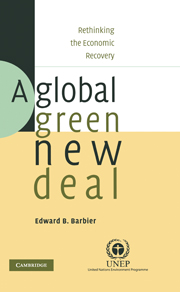Book contents
- Frontmatter
- Contents
- List of figures
- List of tables
- List of boxes
- Foreword
- Preface
- Acknowledgements
- Part I Why a Global Green New Deal?
- Part II The Key Components of a Global Green New Deal
- Part III The Role of the International Community
- Part IV Towards a Greener World Economy
- 10 Summary of recommendations
- 11 Will a Global Green New Deal succeed?
- 12 Beyond a green economic recovery
- Appendix 1 PIIE–WRI analysis of a green recovery program for the United States
- Appendix 2 Pew comparative analysis of clean energy jobs and investments in the United States, 1998–2007
- Glossary
- Index
- References
12 - Beyond a green economic recovery
Published online by Cambridge University Press: 05 June 2012
- Frontmatter
- Contents
- List of figures
- List of tables
- List of boxes
- Foreword
- Preface
- Acknowledgements
- Part I Why a Global Green New Deal?
- Part II The Key Components of a Global Green New Deal
- Part III The Role of the International Community
- Part IV Towards a Greener World Economy
- 10 Summary of recommendations
- 11 Will a Global Green New Deal succeed?
- 12 Beyond a green economic recovery
- Appendix 1 PIIE–WRI analysis of a green recovery program for the United States
- Appendix 2 Pew comparative analysis of clean energy jobs and investments in the United States, 1998–2007
- Glossary
- Index
- References
Summary
Most of this book has been concerned with articulating a vision for the present world economic recovery from the worst global recession since the Great Depression of the 1930s. The premise of this vision is that the right mix of policy actions can stimulate recovery and at the same time improve the sustainability of the world economy. If these actions are adopted, over the next few years they will create millions of jobs, improve the livelihoods of the world's poor and channel investments into dynamic economic sectors. Such a timely mix of policies can be referred to collectively as a Global Green New Deal.
The previous chapters have aimed to show how a GGND is critical to the lasting success of a world economic recovery. Reviving growth, ensuring financial stability and creating jobs should be essential objectives, but unless new policy initiatives also address other global challenges, such as reducing carbon dependency, protecting ecosystems and water resources and alleviating poverty, their impact on averting future crises will be short-lived. Without such progress, restarting the world economy today will do little to address the imminent threats posed by climate change, energy insecurity, growing freshwater scarcity, deteriorating ecosystems and, above all, worsening global poverty. Rather, it is necessary to reduce carbon dependency and ecological scarcity not just because of environmental concerns but because this is the correct and only way to revitalize the economy on a genuinely sustainable basis.
- Type
- Chapter
- Information
- A Global Green New DealRethinking the Economic Recovery, pp. 258 - 280Publisher: Cambridge University PressPrint publication year: 2010



